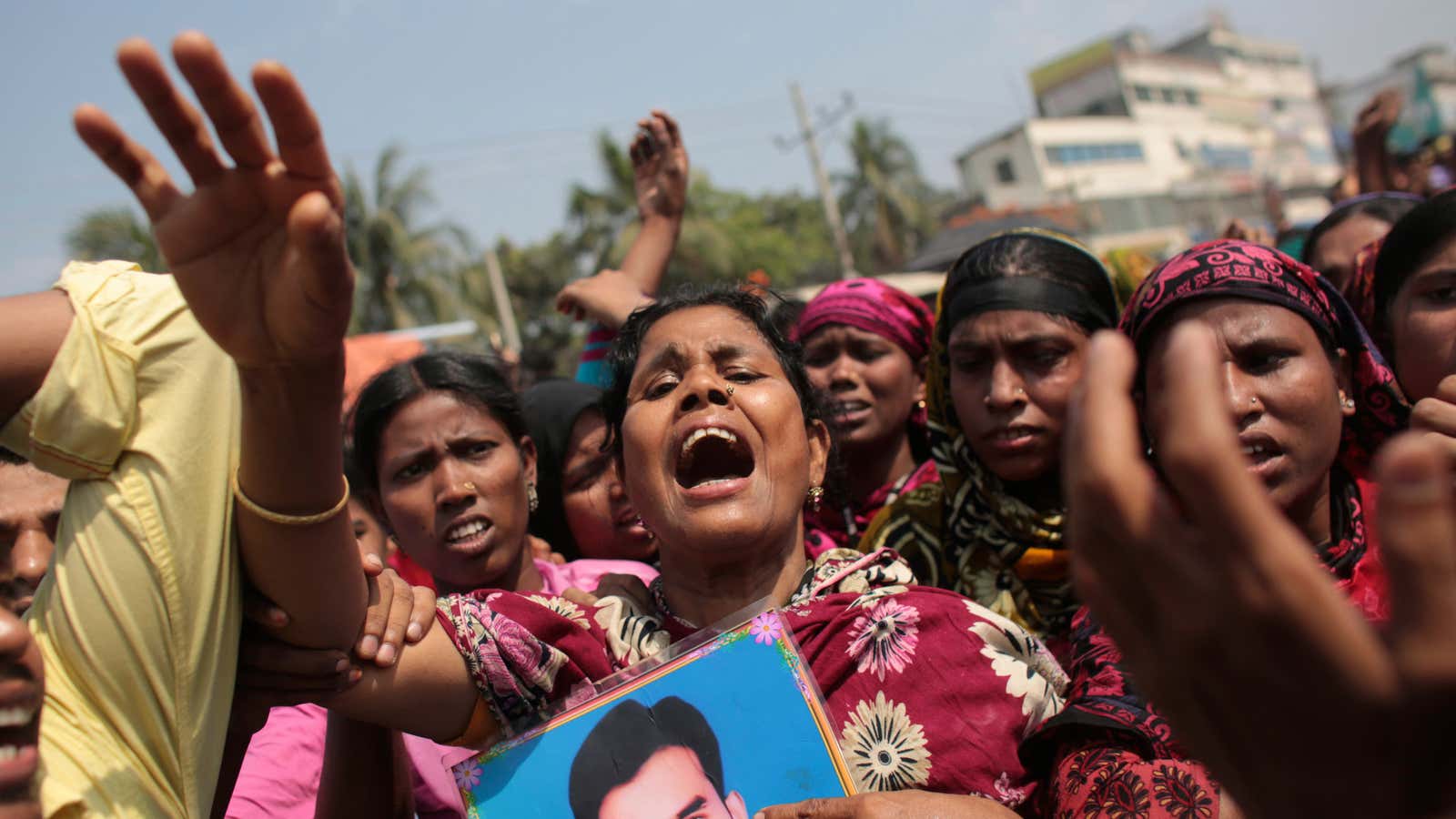This is an excerpt from WOMEN IN CLOTHES, by Sheila Heti, Heidi Julavits and Leanne Shapton. In it, Reba Sikder, an eighteen-year-old garment worker and survivor of the Rana Plaza collapse in Dhaka, Bangladesh, talks to Sara Ziff, founder and executive director of Model Alliance, a nonprofit labor group for models working in the American fashion industry. Kalpona Akter, executive director of the Bangladesh Center for Worker Solidarity, translates between Bengali and English.
Sara Ziff: Can you tell me from the beginning what happened at Rana Plaza?
Reba Sikder: So on that day the 23rd of April, I came to my work, and after doing two hours of work I saw my coworkers rush to escape from the factory, and then our general manager said that we have to leave the factory now. I didn’t even know why—then I went outside. When I was outside I came to know that some workers saw a crack in the building, and sand and concrete had fallen on one worker’s hand. The factory managers said that we should go home and come at two p.m. to the factory again. We went home, and when we came at two p.m., our factory managers said that the building owner told the factory owner that the engineer has inspected the building and it’s fine. It’s safe for running the factory, we can work. So the management told us to go home and come the following morning.

The next morning when I came, I saw that many of my coworkers are standing outside the building and everyone is in fear—whether they should go inside or not. I was standing with them outside, too, and some of them were going inside and then our middle management, they started screaming at us, yelling, “Just go inside! Why you are standing here? You have to go inside.” One of our production managers was slapping female workers—Go inside—and they’re threatening us that if we don’t go inside, we will lose our job and they will not pay our salary. And then we went inside, and I saw that nobody even started work because the people were talking more… What is going to happen? There was a crack in the building. Then our general manager announced that everybody should go back to their machine and start work because there is a rush for shipment—the buyer is putting pressure. He says that we have to hit our production target, then we can go home. We start work because, you know, they’re shouting at us, and I think I worked twenty minutes and then the power was gone. And within two or three minutes they start the generator, and when they start the generator I hear this huge sound, like BOOM, and everything collapsing. My coworkers ran to the stairs and I was following them, and then I fall, and I’m stuck under a machine.
I don’t know how long I was unconscious—and when I got conscious, I was feeling that somebody’s head was on top of my head, and my whole body’s wet because the blood is coming from him. He was stuck, under a beam and column. And I found my feet were stuck under a machine—maybe there was a stool or something—and he was asking for help and screaming for water and to save his life, and he was pushing me, too—he could move only his hands. He was my coworker who was working beside me. When he was pushing me and asking for help, I said, “Brother, I cannot help you. There’s no way I can help, because my feet are stuck, too.” He was able to speak to me for a few minutes and then he died. Aminul—my colleague’s name was Aminul.
So when he died, I got unconscious, and I don’t know how long it’s been, and when I got conscious, I thought, There is no hope that I can escape. But still I wanted to give all effort to escape from that place. And I started kicking the stool, but my feet were stuck. I was able to free my leg. And then I saw there is a tiny place, and I start crawling toward the screams I was hearing from my coworkers. A kind of room or pocket had been made, when this beam and column had fallen. And when I went there, I saw another thirty workers trapped, many of them dead, injured, and everyone is screaming. I saw my other coworkers stuck—many of them thirsty and crying for water—and I saw one of my coworkers drinking her own blood from her injured area, because she was so thirsty and there is nothing she can get.
I got unconscious for many times, and when I got conscious I felt I am so thirsty, and I was crying and screaming for water. Then my coworkers replied that they cannot give me anything because there is no water, and I said, “Whatever you have, please give me, because I’m dying.”
And one of my coworkers, she gave her own urine, which I drank. And I found that, meanwhile, it is two nights and two days since the factory collapsed—it was through my coworkers I came to know. Then I know that we’re all stuck, but four of us among all these survivors, four of us who are skinnier than others, we try to find a way to escape. So we were crawling every single way. We saw there is a tiny way to go. But wherever we would go, it was dark. And when we were crawling to the other area, we saw one of the female workers, she is stuck under a machine, and she said, “Please help me—please save me,” and we replied to her, “Sister, there is no way we can help you, because the way you’re trapped, it is impossible to help you, the ceiling is coming down every single second.” And then she said, “Maybe I will not survive, maybe you cannot help, but I can tell you how to escape from here because I saw—many of the workers went through this area, and I believe they escaped from this building.” Then we started crawling toward that place. But we haven’t found any way to get out, so there is one dark place, four of us sitting and crying, and we thought, There is no hope that we can get out. I cannot tell how big it was—maybe we just crawled in the same place many times because we don’t know where we are going.
So when we were sitting without hope in a place in the dark, and thought maybe we will not survive, suddenly one of my coworkers felt some air that is coming from outside, and then we thought, There is hope. We started crawling to that place where air is coming. And when we’re close to that place, there is a huge sound. We are hearing that people are breaking the wall, breaking the rubble or the concrete. So we started screaming and asking for help. Finally he heard our voice, and he saw us, and he said, “Please stay here—I will not be able to rescue you, because I don’t know how to, but I can call the army, who are doing rescue.” So he called the army, and after half an hour or so, the army came and they rescued the four of us. One machine has fallen on my back, and my neck has been cut up, so there is a screw in my neck; in many, many places in my body there is a screw, and both ankles were injured.
I wanted to say that I worked for this factory and this company, and I was making—including my overtime—$90 a month, but I had to work 8am to 10pm, sometimes overnight. That was seven days a week, thirty days a month. I want to say that I didn’t receive any compensation. Moreover, I cannot say how many coworkers I left in that building, how many of them I lost. It was more like brothers and sisters, because we worked together. I can remember one whole line of sewing workers, they were just trapped—I saw them falling. I lost many, many of them. So I want compensation, and I want a safe working place for our workers. Just think about those workers who lost their limbs—how they will live. And think about those families who had only one person to earn, and they lost that person.
Sara Ziff: Were the workers afraid that morning when they were told they had to go into the factory?
Reba Sikder:��Yes we were afraid. We knew that this building would collapse. But we had to go because the managers said they will not give us our salary. We need to feed ourselves. So that is why we had to go.
Sara Ziff: What would be in the rubble?
Reba Sikder: If you go to the factory area you will see all these fossils, they’re still in there. The rubble might be removed to other places, but people can find all the fossils inside. So it means that the death toll is not eleven hundred thirty-four, it is more. Many families, they’re coming with pictures and say that they didn’t find their bodies. They didn’t find their beloved.
Sara Ziff: How does it affect you now, almost one year later?
Reba Sikder: I couldn’t recover from that. What I went through. When I see my coworkers who lost their limbs, that reminds me of so many things. All the time I remember those faces I left behind, and especially when I see those mothers, or the family members who bring their pictures with them, looking for their family members. If I died in that rubble, my mother would be bringing my picture—coming and going around and asking for me.
This excerpt was reprinted with permission of Blue Rider Press, a division of Penguin Random House. Copyright © 2014 by Sheila Heti, Heidi Julavits and Leanne Shapton.
